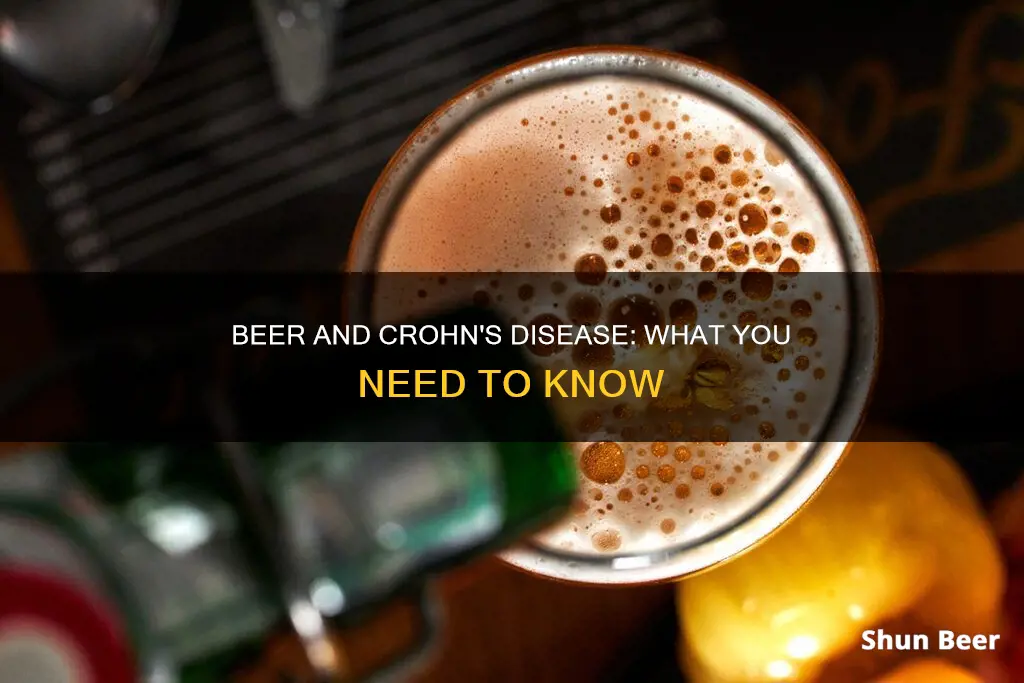
Crohn's disease is a chronic inflammatory bowel disease (IBD) that affects the gastrointestinal tract. While there is no evidence that alcohol is a risk factor for developing Crohn's, it can trigger or worsen symptoms in some people. So, can you drink beer if you have Crohn's disease? The answer is not straightforward and depends on several factors.
Alcohol can irritate the gastrointestinal (GI) lining, leading to potential malabsorption, bleeding, and increased intestinal permeability. It can also negatively impact gut health by disrupting the balance of bacteria and impairing the absorption of key nutrients. Additionally, alcohol has the potential to interfere with IBD medications and increase the risk of gastrointestinal complications.
However, the effects of alcohol on Crohn's disease vary from person to person. Some individuals can tolerate moderate amounts of alcohol without experiencing adverse side effects, while others may find that any amount of alcohol triggers severe reactions. Beer, in particular, has been associated with more abdominal pain and discomfort due to its higher sugar content.
To make an informed decision, it is crucial to consult a healthcare professional. They can guide individuals in understanding their specific triggers and provide advice on how to approach alcohol consumption safely. Keeping a journal to track how the body reacts to different types and amounts of alcohol can also be helpful.
In summary, while there is no simple rule regarding alcohol consumption for people with Crohn's disease, it is generally recommended to practice moderation and be mindful of potential triggers to prevent flare-ups and worsening of symptoms.
| Characteristics | Values |
|---|---|
| Can you drink beer if you have Crohn's disease? | There is no simple answer to this question. While some sources say that it is safe to drink alcohol in moderation, others advise against it. It is best to consult a doctor. |
| --- | --- |
| Alcohol's effect on Crohn's disease | Alcohol can trigger or worsen Crohn's disease symptoms by irritating the GI tract lining, causing intestinal permeability, and activating the immune system. |
| --- | --- |
| Alcohol's effect on medication | Alcohol may interfere with Crohn's disease medication, especially antibiotics like metronidazole (Flagyl). It can also decrease the effectiveness of certain medications and increase the toxicity of others. |
| --- | --- |
| Recommended drinks for people with Crohn's disease | Water is the best option for hydration, while herbal tea and coconut water can also be beneficial. |
What You'll Learn
- Beer and other carbonated alcoholic drinks can cause bloating and abdominal discomfort
- Alcohol can negatively affect the gut biome, increasing the risk of intestinal permeability
- Drinking alcohol while taking Crohn's medication can cause nausea, cramping, vomiting, and headaches
- Alcohol can cause Crohn's flare-ups by exacerbating common effects of the disease
- Beer can set off diarrhoea due to the volume consumed

Beer and other carbonated alcoholic drinks can cause bloating and abdominal discomfort
A study from 2007 found that participants who consumed beer experienced more abdominal pain than those who drank other types of alcohol. The researchers attributed this to the higher sugar content in beer. Another study from 2011 found that drinking even moderate amounts of red wine can cause increased permeability in the intestines, which could lead to flare-ups and aggravated symptoms.
Alcohol can also worsen gut health by disrupting the amount, diversity, and balance of bacteria in the digestive tract. This can lead to rectal bleeding and poor nutrient absorption. In addition, alcohol can increase the risk of gastrointestinal complications such as gastritis (inflammation of the stomach).
It's important to note that the effects of alcohol can vary from person to person. Some people with Crohn's disease may be able to tolerate small amounts of alcohol without experiencing adverse effects, while others may find that any amount of alcohol irritates their GI tract. It's always best to consult with a healthcare professional to understand how alcohol may affect your specific condition.
The Science Behind Beer Koozies: Do They Really Work?
You may want to see also

Alcohol can negatively affect the gut biome, increasing the risk of intestinal permeability
Alcohol and Crohn's Disease
How Alcohol Affects the Gut
Alcohol can have a significant impact on the gut and, by extension, Crohn's disease. While small amounts of alcohol can suppress the immune system, which may be beneficial for people with Crohn's disease, excessive alcohol consumption can irritate the lining of the gastrointestinal (GI) tract and increase intestinal permeability, also known as a "leaky gut".
Alcohol's Effect on the Gut Biome
The gut microbiome refers to the balance of bacteria, viruses, and fungi in the gut, primarily the colon and rectum. A healthy gut microbiome supports the immune system, metabolism, inflammation regulation, and defence against toxins. However, alcohol consumption can disrupt this balance, leading to a state of dysbiosis, where the gut microbiome is imbalanced, with an overgrowth of pathogenic bacteria. This imbalance can lead to increased intestinal permeability and a higher risk of toxins entering the bloodstream.
Increased Intestinal Permeability
A healthy gut lining acts as a barrier, separating the interior of the intestine, which contains microbes, food, and toxins, from the rest of the body. Alcohol can increase intestinal permeability, making the gut "leakier". This allows bacteria and toxins to enter the bloodstream, leading to local and systemic inflammation and potentially contributing to liver disease and neuroinflammation.
Alcohol's Impact on Crohn's Disease
For individuals with Crohn's disease, a disease that causes inflammation of the GI tract, alcohol consumption can have mixed effects. While moderate alcohol consumption may be safe and even provide some benefit by suppressing an overactive immune system, excessive alcohol can irritate the GI tract lining, making the gut leakier and triggering more inflammation. Therefore, it is crucial for individuals with Crohn's disease to drink in moderation and avoid excessive alcohol consumption, especially during active flare-ups.
The Science of Sipping: Beer Steins Explained
You may want to see also

Drinking alcohol while taking Crohn's medication can cause nausea, cramping, vomiting, and headaches
It is important to consult a doctor or a gastroenterologist before consuming alcohol when taking any medication for Crohn's disease. They can advise on potential interactions and help determine whether it is safe to consume alcohol.
In general, alcohol can trigger or worsen Crohn's disease symptoms, including gastrointestinal issues, as it affects the gut biome and increases intestinal permeability. However, the severity of symptoms and triggers can vary from person to person. Some individuals may be able to tolerate moderate amounts of alcohol without adverse effects, while others may experience severe reactions.
Additionally, different types of alcohol can have varying impacts. For example, beer and carbonated alcoholic drinks tend to cause more abdominal pain and discomfort due to their higher sugar content. On the other hand, red wine, in moderation, has been associated with reduced inflammation, although it can also contribute to intestinal permeability issues.
Overall, it is crucial for individuals with Crohn's disease to be cautious when consuming alcohol, as it may negatively affect their condition and interact with their medications.
Paxlovid and Beer: Is It Safe to Mix?
You may want to see also

Alcohol can cause Crohn's flare-ups by exacerbating common effects of the disease
Alcohol is a common trigger for Crohn's disease, and research suggests that it may affect the gut biome, potentially increasing the risk of intestinal permeability in the intestine. This could activate the immune system, triggering or worsening Crohn's symptoms. Additionally, alcohol can irritate the lining of the gastrointestinal tract and make the gut more permeable. Normally, the intestines are lined with a tight barrier that keeps out partially digested food, toxins, and germs. However, alcohol can cause a breakdown of this barrier, allowing these substances to enter the intestines and trigger inflammation. This increase in intestinal permeability is a hallmark of predicting long-term Crohn's flare-ups.
The impact of alcohol on Crohn's disease may also be influenced by the type of alcohol consumed. Sugary mixed drinks, such as daiquiris and coladas, can act as laxatives, causing the intestines to pull in extra water and leading to diarrhea. Beer can also trigger diarrhea due to the higher volume typically consumed compared to wine or straight alcohol. Red wine, in moderate amounts, can cause increased permeability in the intestines, which could lead to flare-ups and aggravated symptoms.
Furthermore, people with Crohn's disease may exhibit intolerance to certain foods and drinks, with alcohol being a common trigger. It is important for individuals with Crohn's disease to identify their specific triggers and avoid them. While some people may be able to tolerate moderate amounts of alcohol without adverse effects, others may experience severe reactions. The effects of alcohol on Crohn's disease are not universal, and each person's experience may vary. Therefore, it is crucial to consult with a healthcare professional to understand how alcohol may impact their condition and to make informed decisions regarding alcohol consumption.
Beer and Vitamins: What's the Deal?
You may want to see also

Beer can set off diarrhoea due to the volume consumed
Beer, Crohn's Disease, and Diarrhea
Crohn's disease is a chronic inflammatory bowel disease (IBD) that affects the gastrointestinal tract. People with Crohn's disease must be mindful of their diet, as certain foods and drinks can trigger or worsen symptoms. While alcohol can be consumed in moderation, it can irritate the GI lining and cause malabsorption and bleeding.
Beer, in particular, can set off diarrhoea due to the volume typically consumed. Beer contains a high volume of carbohydrates, and the body can struggle to break these down while processing alcohol. This can lead to an accelerated digestive process, resulting in diarrhoea. The ethanol in alcohol speeds up digestion, giving the colon less time to absorb water, which leads to watery stools.
Additionally, the high volume of carbs in beer, coupled with the accelerated digestive process, means some carbohydrates may enter the large intestine without being broken down. Bacteria in the large intestine then ferment these remaining carbohydrates, leading to gas, cramping, and diarrhoea.
The risk of diarrhoea is further increased when consuming several alcoholic drinks in quick succession, known as binge drinking. Consuming heavy foods while drinking can also increase the risk, as the body has trouble digesting food when alcohol is present in the intestinal tissues.
People with Crohn's disease should be cautious when consuming alcohol, as it can affect the disease's symptoms. While moderate alcohol consumption may be safe, it is essential to monitor how different types of drinks affect the body and adjust accordingly.
Beer Tastes Better After a Good Workout: Why?
You may want to see also
Frequently asked questions
It depends. Alcohol is a common trigger for Crohn's disease, so some people may need to avoid it or restrict their intake. Beer, in particular, can set off diarrhea because people tend to drink a higher volume of it than wine or spirits. However, the effects of alcohol vary from person to person, and some people with Crohn's disease can tolerate moderate amounts of alcohol without adverse side effects. If you have Crohn's disease and want to drink beer, it's important to speak to your doctor first and monitor how your body responds.
Alcohol can irritate the gastrointestinal (GI) tract and trigger Crohn's disease symptoms such as abdominal pain, rectal bleeding, and diarrhea. It can also negatively impact gut health by disrupting the balance of bacteria in the digestive tract and impairing the absorption of key nutrients. In addition, alcohol increases the risk of gastrointestinal complications and can interfere with medications used to treat Crohn's disease.
Yes, adequate fluid intake is important for people with Crohn's disease, especially during flare-ups or when experiencing diarrhea. Water is the best option for hydration, but herbal tea and coconut water can also help. It's important to avoid sugary drinks, carbonated beverages, and drinks containing caffeine, as these can trigger Crohn's symptoms.
If you have Crohn's disease and choose to drink alcohol, it's important to drink in moderation and pay attention to how your body responds. Drinking a glass of water for every alcoholic beverage can help with hydration. It's also crucial to speak to your doctor about potential interactions between alcohol and any medications you're taking for Crohn's disease.







